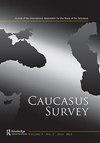Agency and perceptions of smallness: understanding Georgia’s foreign policy behaviour
IF 0.5
Q3 AREA STUDIES
引用次数: 2
Abstract
ABSTRACT The conventional wisdom says that material and structural constraints push small states into a more or less predictable foreign and security policy. Georgia’s case shows that, together with these limitations, the foreign policy of small states is also influenced by the way the ruling elites perceive the smallness of their state. This article explains why at different periods of time Georgia demonstrated diverging and even contradictory foreign policy behaviours, despite not achieving significant economic and military strength or witnessing crucial systemic changes in its security environment. I argue that the way ruling elites interpreted smallness influenced their understanding of Georgia’s foreign policy capacity and agency in the international system. This in turn pushed Georgia into fundamentally different paths, stretching from a passive and mostly reactive foreign policy to a highly ambitious, uncompromising and hawkish one.机构和对小国的看法:了解格鲁吉亚的外交政策行为
摘要传统观点认为,物质和结构的限制促使小国采取或多或少可预测的外交和安全政策。格鲁吉亚的案例表明,除了这些限制之外,小国家的外交政策也受到统治精英对其国家小国的看法的影响。这篇文章解释了为什么格鲁吉亚在不同时期表现出不同甚至矛盾的外交政策行为,尽管它没有取得显著的经济和军事实力,也没有见证其安全环境的重大系统性变化。我认为,统治精英对小国的理解影响了他们对格鲁吉亚外交政策能力和在国际体系中的作用的理解。这反过来又将格鲁吉亚推向了一条根本不同的道路,从被动的、主要是被动的外交政策延伸到雄心勃勃、毫不妥协和鹰派的外交政策。
本文章由计算机程序翻译,如有差异,请以英文原文为准。
求助全文
约1分钟内获得全文
求助全文
来源期刊

Caucasus Survey
Arts and Humanities-History
CiteScore
1.30
自引率
9.10%
发文量
4
期刊介绍:
Caucasus Survey is a new peer-reviewed, multidisciplinary and independent journal, concerned with the study of the Caucasus – the independent republics of Armenia, Azerbaijan and Georgia, de facto entities in the area and the North Caucasian republics and regions of the Russian Federation. Also covered are issues relating to the Republic of Kalmykia, Crimea, the Cossacks, Nogays, and Caucasian diasporas. Caucasus Survey aims to advance an area studies tradition in the humanities and social sciences about and from the Caucasus, connecting this tradition with core disciplinary concerns in the fields of history, political science, sociology, anthropology, cultural and religious studies, economics, political geography and demography, security, war and peace studies, and social psychology. Research enhancing understanding of the region’s conflicts and relations between the Russian Federation and the Caucasus, internationally and domestically with regard to the North Caucasus, features high in our concerns.
 求助内容:
求助内容: 应助结果提醒方式:
应助结果提醒方式:


